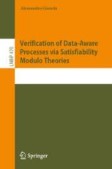Search
Search Results
-
Algebraic Structures Formalizing the Logic of Quantum Mechanics Incorporating Time Dimension
As Classical Propositional Logic finds its algebraic counterpart in Boolean algebras, the logic of Quantum Mechanics, as outlined within G. Birkhoff...
-
Formalizing service-dominant logic as a general theory of markets: taking stock and moving forward
Advancement of the marketing discipline requires a marketing-based, general theory of markets. However, most academic marketing is developed from...

-
Formalizing ethical principles within AI systems: experts’ opinions on why (not) and how to do it
AI systems are increasingly put into contexts where computed decisions must be guided by ethical considerations. To develop ethically grounded...

-
Overcoming Fragmentation in Motivation Science: Why, When, and How Should We Integrate Theories?
Theories in motivation science, and in psychological science more generally, are in a state of fragmentation that impedes development of a robust...
-
Enabling conservation theories of change
Global theories of change (ToCs) can provide broad, overarching guidance for conservation and sustainable use of Earth’s ecosystems. However, broad...

-
Bridging the gap between complexity science and clinical practice by formalizing idiographic theories: a computational model of functional analysis
BackgroundThe past decades of research have seen an increase in statistical tools to explore the complex dynamics of mental health from patient data,...

-
Formalizing psychological interventions through network control theory
Despite the growing deployment of network representation to comprehend psychological phenomena, the question of whether and how networks can...

-
Generalized Optimization Modulo Theories
Optimization Modulo Theories (OMT) has emerged as an important extension of the highly successful Satisfiability Modulo Theories (SMT) paradigm. The...
-
Formalizing the Equivalence of Formal Systems in Propositional Logic in Coq
In the field of artificial intelligence, propositional logic provides a precise and efficient reasoning structure for computers to simulate human...
-
New supersymmetric string theories from discrete theta angles
We describe three previously unnoticed components of the moduli space of minimally supersymmetric string theories in d ≥ 7, describing in some detail...
-
Formalizing complexity in the life sciences: systems, emergence, and metafluxes
Current plant sciences (as the life sciences in general) tend to follow an empirical rationale focussing on the molecular scale (genes, proteins),...

-
A Methodology for Formalizing Different Types of Norms
In a world where many activities are carried out digitally, it is increasingly urgent to be able to formally represent the rules, norms, and policies...
-
Formalizing and Reasoning About Supply Chain Contracts Between Agents
Inspired by the recent problems in supply chains, we propose an approach to declarative modeling of contracts between agents that will eventually...
-
Formalizing the Independence of Propositional Logic Axiom System in Coq
The development of computer science has promoted the formalization of mathematical theorem proofs, making it especially crucial to use machine...
-
Generalized possibilistic theories: the multipartite experiments problem
In a recent paper, the author introduced an operational description of physical theories where probabilities are replaced by counterfactual...

-
Formalizing planning and information search in naturalistic decision-making
Decisions made by mammals and birds are often temporally extended. They require planning and sampling of decision-relevant information. Our...

-
Formalizing the four-layer metamodeling stack with MetaMorph: potential and benefits
Enterprise modeling deals with the increasing complexity of processes and systems by operationalizing model content and by linking complementary...

-
Uniform Interpolation for Database Theories
This second part of the book is devoted to studying sophisticated automated reasoning techniques to solve efficiently the problem of eliminating...
-
On Cut-Elimination Arguments for Axiomatic Theories of Truth
As is mentioned in Leigh ( Journal of Symbol Logic 80(3):845-865, 2015), it is an open problem whether for several axiomatic theories of truth,...
-
A Probabilistic Framework for Formalizing Epistemic Shifts
The term “epistemic shifts” refers to a widely recognized phenomenon that knowledge ascribers would ascribe different epistemic statuses to the same...
